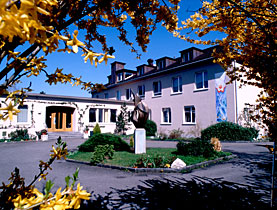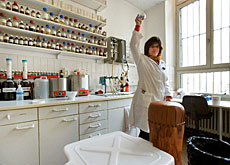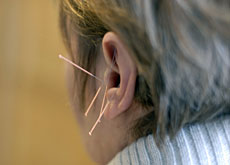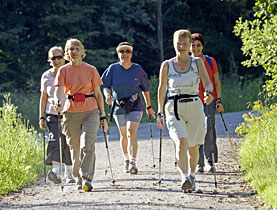Clinic aims for holiday not hospital feeling

Swiss voters will decide later this month on whether alternative medicine should be a form of treatment covered by mandatory health insurance.
Ahead of the nationwide vote, swissinfo visited the Lukas Clinic outside Basel which offers cancer patients herbal and art therapies along with more traditional forms of treatment.
The colours and the friendly impression at the Lukas Clinic in Arlesheim conjure up a totally different impression from the typical hospital with its peculiar smell and atmosphere.
Instead the clinic seeks to put the patient as a human being at the centre. This means that doctors plan their consultations together with the patients.
“The doctor sees the patient when he or she is not in therapy,” says staff nurse Christoph von Dach.
Bianca* sits in the room for voice therapy. She has been diagnosed with breast cancer.
“I know that the disease will still be on my mind when I leave the clinic after three weeks. But I have learned things here that will help me cope in my everyday life,” Bianca explains.
She says the speech therapy made her realise that her voice is an instrument she can apply.
“Until now my voice and my language only had a external purpose. But now it is beginning to have an impact internally,” Bianca says.
Healing
She is aware that breast cancer is one of the most common forms of cancer among women and that many patients suffer relapses.
“I have to include this medical diagnosis in my life and do the best I can to avoid a relapse,” says Bianca.
She appreciates that this hospital, unlike conventional medicine, does not focus on the disease. “They put the emphasis on healing.”
In addition to conventional treatments such as chemotherapy the Lukas Clinic offers a range of creative activities, including language, music, light and colour therapies as well as sculpting.
“It is also about becoming a complete person and more whole. This is done not only through medication on a physical level. Therapies and interaction with therapists play in important part,” says Sophie*.
She now comes to Arlesheim as an outpatient for two days a month after a three-week stay in the clinic.
“I saw excellent doctors in several other hospitals before. But it was only here that I felt fully respected as a human being and a young woman,” Sophie says.
Middle ground
Patients often come to Arlesheim because they have heard that the clinic offers additional therapies. But many people wonder what they have got themselves into when they are asked to paint and draw, or to join an exercise therapy, according to Doctor Hans-Richard Heiligtag.
“It is possible to enjoy a long and happy life, despite suffering a disease, as long as the quality of life is not affected. It is not about ‘Either we can eradicate it or else it is a hopeless case’. There is a middle ground.”
Heiligtag says he has cancer patients who should have died long ago if statistics and conventional medicine were the only methods to go by.
“The therapies help a great deal. They stop the disease getting worse and the quality of life remains high,” he concludes.
Special attention is given to nutrition and eating habits at the Lukas Clinic.
“Wherever possible we try to use locally-grown organic produce that is served fresh,” says staff nurse von Dach.
As a rule there is no room service for lunch and dinnertime meals. Instead patients gather in the elegant dining room. They are not served but help themselves from tureens and platters of food placed on the table.
“This can be important, because some chemotherapy patients develop a dislike for certain foods, for instance lettuce,” says von Dach.
Sophie says she liked the communal table idea very much and she certainly appreciated the fact that the group did not discuss medical stories and diseases.
“It was just like being together with others. You felt part of a group that shares a similar medical diagnosis,” she says.
“All in all it gave the stay here a holiday atmosphere in a hotel and not the feeling of being in a clinic,” Sophie adds.
Mistletoe
The use of mistletoe, also known as iscador therapy, is a central element of the treatment at the clinic.
“This method allows us to reduce the side-effects of chemo- and radiotherapy,” says Doctor Jürgen Johannes Kuehn.
The specialist has been working in emergency medicine and clinical research for the past 25 years.
The aim of alternative medicine is to improve the quality of life for the patient. “We use the iscador therapy before a patient undergoes chemo- or radiotherapy if possible,” says Kuehn.
It helps to keep the inevitable damage to the body to a minimum and speed up the healing process, he says.
Kuehn rejects criticism that alternative- or complementary – forms of medicine do not meet scientific standards.
“Anthroposophical medicine is not just a theory. It is known that a weakened immune system has an impact on how a disease might develop.
Kuehn adds that mistletoe can give a boost to lymphocytes which, together with anti-bodies, destroy cancerous growths.
“In most cases it helps increase the number of white blood cells,” Kuehn says.
* name has been changed
swissinfo, based on an article in German by Etienne Strebel

More
Health insurance
Voters will decide on May 17 whether alternative medicine should be a form of treatment covered by mandatory health insurance.
Most political parties, apart from the rightwing Swiss People’s Party, have come out in favour of the proposal.
In 2005 the interior ministry struck five alternative therapies, including anthroposophical medicine, homeopathy, traditional Chinese medicine, neural and herbal therapies, off the list of paid health services.
It argued they failed to meet the criteria on efficacy, cost-effectiveness and sustainability.
Supporters collected enough signatures to force a nationwide on the re-introduction of these therapies, but later withdrew their initiative after parliament agreed its own, modified, version.
The therapy relies on a holistic approach to medicine and focuses on strengthening the patient’s organism and individuality.
It approaches disease as an imbalance in the biological organism and is intended to restore the balance.
The treatment includes medicines based upon modified homeopathic principles and physical therapies, including massage and artistic therapy.
The system was founded by the Austrian philosopher, scholar and esotericist, Rudolf Steiner, in the 1920s.

In compliance with the JTI standards
More: SWI swissinfo.ch certified by the Journalism Trust Initiative




You can find an overview of ongoing debates with our journalists here. Please join us!
If you want to start a conversation about a topic raised in this article or want to report factual errors, email us at english@swissinfo.ch.